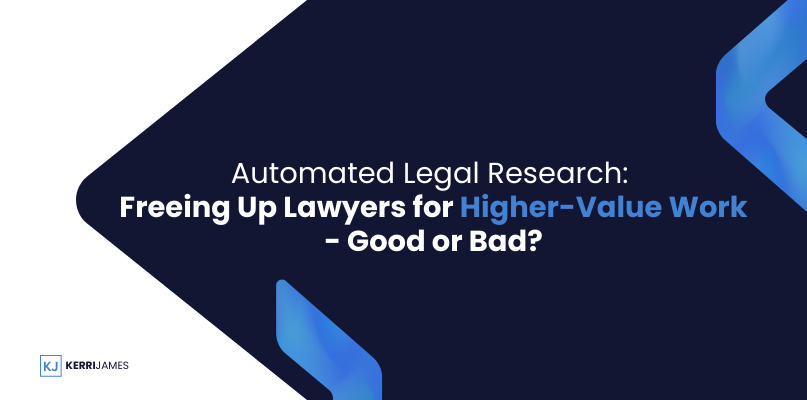In the digital age, the legal profession is witnessing a transformative shift driven by advances in technology. One of the most significant developments is the rise of AI-powered research tools, designed to streamline the traditionally labor-intensive process of legal research. These tools promise to free up valuable time for lawyers, allowing them to focus on higher-value tasks such as legal analysis, strategy development, and client interaction. However, as with any technological innovation, the adoption of automated legal research raises important questions: Is this change beneficial for the legal profession, or does it carry risks that could impact the quality of legal work?
This blog will explore the impact of AI-powered research tools on the legal industry, highlighting both the potential benefits and the challenges. We’ll consider how these tools are reshaping the role of lawyers, what they mean for the future of legal practice, and whether the shift towards automation is ultimately good or bad for the profession.
The Evolution of Legal Research
Traditional Legal Research
Traditionally, legal research has been a cornerstone of the legal profession, requiring meticulous attention to detail and significant time investment. Lawyers and paralegals would manually sift through vast volumes of case law, statutes, and legal precedents, often spending hours in law libraries or using early digital databases. This process, while thorough, was often inefficient and prone to human error, with the possibility of overlooking critical information.
The Rise of AI-Powered Research Tools
The advent of AI-powered research tools marks a new era in legal research. These tools use sophisticated algorithms and machine learning to analyze legal texts, identify relevant cases and statutes, and even predict legal outcomes based on past decisions. By automating much of the manual labor involved in research, AI tools can process large datasets quickly and accurately, offering insights that might take a human researcher much longer to uncover.
Advantages of AI-Powered Legal Research Tools
AI-powered legal research tools offer several key benefits that can significantly enhance the efficiency and effectiveness of legal work.
1. Increased Efficiency
One of the most notable advantages of AI in legal research is the significant increase in efficiency. AI tools can scan through thousands of documents in a fraction of the time it would take a human researcher. This efficiency not only speeds up the research process but also enables lawyers to handle more cases simultaneously, improving overall productivity.
For example, an AI-powered tool can quickly identify relevant case law or statutes that apply to a specific legal issue, allowing lawyers to spend less time on research and more time on strategic tasks like building arguments or advising clients.
2. Enhanced Accuracy
Another major benefit of AI-powered tools is their ability to enhance the accuracy of legal research. By eliminating the risk of human error, AI tools ensure that no relevant information is overlooked. These tools are designed to recognize patterns in legal texts and can draw connections that might not be immediately apparent to a human researcher.
For instance, AI can detect subtle similarities between cases that might suggest a precedent, even when those cases do not appear obviously related. This level of precision is particularly valuable in complex legal matters where the stakes are high and every detail counts.
3. Cost Savings
The efficiency and accuracy provided by AI-powered research tools can lead to significant cost savings for law firms. By automating time-consuming research tasks, firms can reduce the number of billable hours spent on these activities, thereby lowering costs for clients. This can make legal services more accessible and competitive, particularly in an increasingly cost-sensitive market.
Moreover, smaller firms and solo practitioners who may not have the resources to employ large research teams can benefit from AI tools, allowing them to compete more effectively with larger firms.
4. Focus on Higher-Value Work
AI-powered research tools free up lawyers to focus on tasks that require human judgment and expertise, such as legal analysis, strategy development, and client counseling. By shifting the burden of routine research to AI, lawyers can spend more time crafting nuanced legal arguments, developing innovative strategies, and building stronger relationships with clients.
This shift not only improves the quality of legal services but also enhances job satisfaction among lawyers, who can engage in more intellectually stimulating work rather than repetitive tasks.
Potential Challenges and Drawbacks
Despite the clear benefits, the adoption of AI-powered legal research tools also presents several challenges that must be carefully managed.
1. Over-Reliance on Technology
One of the primary concerns is the risk of over-reliance on AI tools. While AI can process information quickly and accurately, it lacks the human ability to exercise judgment and interpret nuances in legal texts. Lawyers who rely too heavily on AI may risk missing critical insights that require a deeper understanding of the law.
Moreover, AI tools are only as good as the data they are trained on. If the underlying data is biased or incomplete, the AI’s recommendations may be flawed, potentially leading to incorrect legal conclusions.
2. Ethical and Privacy Concerns
The use of AI in legal research also raises important ethical and privacy issues. AI tools often require access to large datasets, including sensitive client information. Ensuring that this data is handled securely and in compliance with privacy regulations is crucial. Any breach of confidentiality could have serious legal and reputational consequences for law firms.
Additionally, there is the issue of bias in AI systems. If AI tools are trained on biased data, they may perpetuate existing biases in the legal system, leading to unfair outcomes. This is a significant concern that requires ongoing monitoring and regulation.
3. Impact on Legal Employment
The increasing use of AI-powered research tools may also impact employment in the legal sector, particularly for entry-level positions such as paralegals and junior associates. These roles traditionally involve significant amounts of legal research, and as AI takes over these tasks, there may be fewer opportunities for young lawyers to gain practical experience.
This shift could have long-term implications for the legal profession, as it may reduce the opportunities for skill development and mentorship that are essential for career growth.
4. The Risk of Complacency
Another potential drawback is the risk of complacency among lawyers. With AI handling the heavy lifting in research, there may be a temptation to rely too much on technology and skip important steps in the legal process, such as double-checking sources or critically analyzing the results.
This complacency could lead to a decline in the quality of legal work and increase the likelihood of errors, which could have serious consequences for clients and the legal profession as a whole.
Striking the Right Balance
To maximize the benefits of AI-powered legal research tools while mitigating the risks, it’s important for law firms to strike the right balance between technology and human expertise.
1. Integrating AI with Human Judgment
The most effective use of AI in legal research is as a tool that complements, rather than replaces, human judgment. While AI can handle routine tasks and process large amounts of data quickly, it is ultimately up to the lawyer to interpret the results, apply legal principles, and make strategic decisions.
By integrating AI into the research process, lawyers can leverage the strengths of both technology and human expertise, leading to more efficient and effective legal services.
2. Maintaining Ethical Standards
As AI becomes more prevalent in legal research, it’s crucial for law firms to maintain high ethical standards. This includes ensuring that AI tools are used in a way that respects client privacy and confidentiality and that any potential biases in AI systems are identified and addressed.
Law firms should establish clear guidelines for the use of AI, including protocols for data security and ethical decision-making. Regular audits and reviews of AI tools can help ensure that they are functioning as intended and that any potential issues are addressed promptly.
3. Providing Training and Development
To mitigate the impact of AI on legal employment, law firms should invest in training and development programs for their staff. This can help ensure that young lawyers still have opportunities to develop their skills and gain experience, even as AI takes over some of the more routine tasks.
For example, firms could offer mentorship programs, advanced legal training, and opportunities to work on complex cases that require human judgment and creativity. By focusing on the areas where human lawyers add the most value, firms can create a more balanced and fulfilling work environment.
4. Encouraging Critical Thinking
Finally, it’s essential for law firms to encourage critical thinking among their lawyers. While AI can handle many aspects of legal research, it’s up to the lawyer to interpret the results, identify potential issues, and make strategic decisions.
Law firms should foster a culture of curiosity and critical thinking, where lawyers are encouraged to question assumptions, explore alternative perspectives, and engage in deep analysis. This approach will ensure that AI is used to enhance, rather than diminish, the quality of legal work.
The Verdict
The rise of AI-powered legal research tools represents a significant shift in the legal profession, offering numerous benefits in terms of efficiency, accuracy, and cost savings. By automating routine research tasks, these tools allow lawyers to focus on higher-value work, such as legal analysis, strategy development, and client interaction.
However, the adoption of AI in legal research also presents challenges, including the risk of over-reliance on technology, ethical concerns, and the potential impact on legal employment. To navigate these challenges, law firms must strike the right balance between technology and human expertise, ensuring that AI is used as a tool to enhance, rather than replace, the role of the lawyer.
Ultimately, the integration of AI into legal research has the potential to transform the legal profession for the better—provided it is done thoughtfully and with a commitment to maintaining the highest standards of quality and ethics.










